Belmont Forum Synthesis Meeting 10-12 December 2016 San Francisco, CA - Synthesis of first project results
Heath Kelsey · 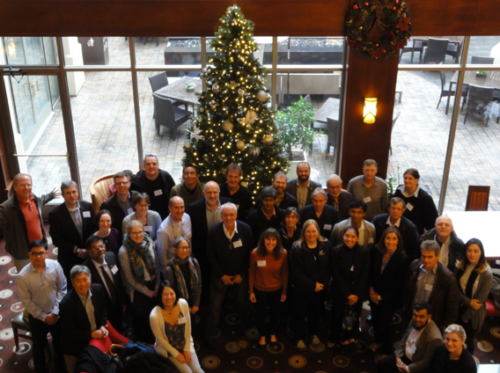
Bill Dennison, Vanessa Vargas, and I traveled to San Francisco, California from 10 to 12 of December 2016 to help our partners Martin LeTissier, and Shona Paterson at Future Earth’s Coasts, to facilitate a meeting of a select group of Belmont Forum project leaders. The Belmont Forum is a consortium of national-level research funders that have targeted funds toward research that actively integrates stakeholders into a co-design/co-development process with researchers. The forum has articulated a grand challenge in environmental sustainability called the “Belmont Challenge”:
“To deliver knowledge needed for action to avoid and adapt to detrimental environmental change including extreme hazardous events.”1
Co-development and co-design is a tool for improved outcomes of sustainability research, and improved relevance of research to local needs and uptake of the results, because it involves stakeholders at a project’s inception. Outcomes from Belmont funded projects have been positive, but it is difficult to discern overall progress toward global sustainability solutions by examining the individual project results.
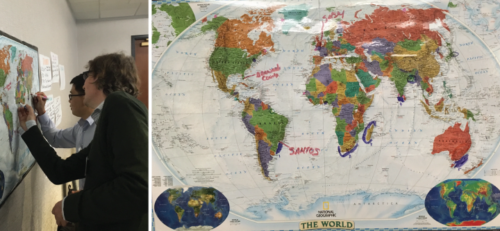
The San Francisco meeting was intended to synthesize results from 12 of the first group of funded projects in Coastal Sustainability and Freshwater Security, which began in 2013. Our purpose was to take stock of how projects have been using stakeholder engagement approaches, and how the goals of the Belmont Forum are being realized. We hope to reveal what works and what doesn’t in terms of stakeholder engagement in co-design, as well as progress toward addressing the Belmont Challenge.
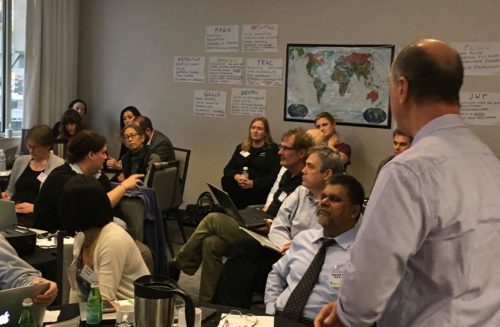
We learned about a diverse suite of projects addressing freshwater vulnerability and coastal sustainability issues in Australia, Bangladesh, Brazil, Cambodia, Canada, Costa Rica, France, Greenland, India, Japan, Jordan, Mozambique, Nigeria, Russia, Senegal, South Africa, the United Kingdom, and the United States. Projects had a great diversity of focus areas and co-development techniques from visioning for “enough water for all” given changing seasonal rainfall patterns and development in Costa Rica to integrating art, science, and policy to improve cultural considerations in adaptation in eight cities on 5 continents.
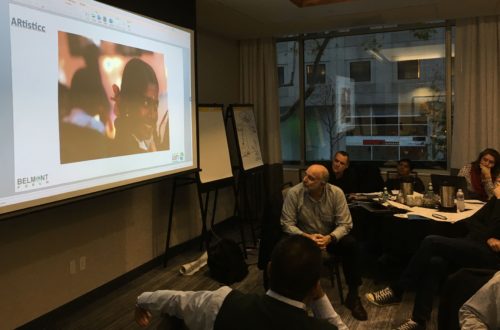
Each of the projects listed impressive accomplishments, which were synthesized by workshop participants into comprehensive summaries of achievements, benefits of co-development, and gaps and challenges encountered. Taken together, the achievements revealed that transdisciplinary approaches and co-development with stakeholders is a powerful way to increase impact and relevance. We are preparing a synthesis document and a summary paper that will further detail these results and next steps for these projects. These results suggest that intense stakeholder engagement to co-develop locally based solutions is an approach that should be continued, expanded, and refined in future Belmont cycles.
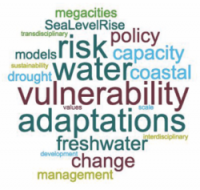
From our perspective, the meeting was a huge success. It served as a forum for projects to learn from each other, and the ability to knit together the result of such a diversity of projects revealed a promising approach for addressing some of the world’s most pressing and difficult issues. The benefits to IAN’s involvement in this process are multifaceted. As usual, we learned about new locations, issues, projects, and approaches for solving problems, and it is exciting to be a part of the future of solving some of society’s great problems on such a great scale. The bonus for us is that we meet and get to work with wonderful people and dedicated researchers – we hope to work with these folks much more in the future!
1 The Belmont Challenge: A Global, Environmental Research Mission for Sustainability. White paper [pdf]
About the author
Heath Kelsey
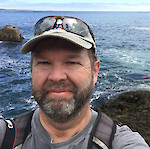
Heath Kelsey has been with IAN since 2009, as a Science Integrator, Program Manager, and as Director since 2019. His work focuses on helping communities become more engaged in socio-environmental decision making. He has over 10-years of experience in stakeholder engagement, environmental and public health assessment, indicator development, and science communication. He has led numerous ecosystem health and socio-environmental health report card projects globally, in Australia, India, the South Pacific, Africa, and throughout the US. Dr. Kelsey received his MSPH (2000) and PhD (2006) from The University of South Carolina Arnold School of Public Health. He is a graduate of St Mary’s College of Maryland (1988). He was also a Peace Corps Volunteer in Papua New Guinea from 1995-1998.